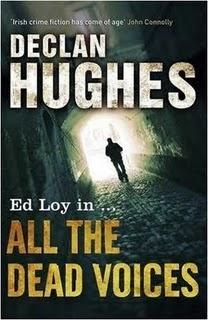All the Dead Voices

I have always been drawn to a good crime story. When I was given the opportunity to read a writer previously unknown to me, a book that sold itself as a cross breed of modern American noir and Irish culture, I was excited at the prospect. I should have opted for a love story.
All the Dead Voices is a strange mix of modern American urban gangster style with an Irish bent and a distinct dislike of the female in all her forms. As I read, I kept attempting to find a connection to Declan Hughes' story, the characters, the history, and even the location. However, there is such disparity between my expectations and what the pages hold that this connection never came about.
Ed Loy is trying to escape his past, but I’m still fuzzy about what that past entailed. He is a private investigator in Ireland. Maybe this is the true mystery—how a reader can understand a character that was fleshed out in three previous novels without sufficient introduction for those of us joining the series in progress. For me, a good story is defined by its ability to make me believe in the characters, good and bad. I have to admit that I don’t know any of them besides Ed himself, well enough to like or dislike them. Ed wallows through the mire of a slow story, which is also somewhat disjointed, to attempt to solve murders, have sex with everything in a skirt, and feel sorry for himself and his lot in life.
Three murders occur in a short period of time. All three people killed were speaking with Ed just moments before their demise. You’d think the proper authorities would have wondered at his participation. Ed seems to be free to associate with known felons and a soccer star murdered “gangland style,” and yet Ed escapes without so much as a second look. He stumbles through life in the pages of this book being almost, but not completely, unlikeable. Otherwise he wouldn’t be having so much sex, I suppose.
The only female character worthy of a name is Anne Fogarty. She is recently divorced, obviously pretty and walks into Ed’s office and his life to find out about the murder of her father. The man who served time for this murder has been set free and Anne believes him to be innocent. She wants to know the truth about her father’s death, her mother’s involvement (she was having an affair at the time with the prime suspect). Anne has found the NBCI to be unwilling to help. By the way, I had to look online to find out what NBCI stands for—National Bureau of Criminal Investigation, an arm of the Irish police force. Mr. Hughes has a tendency to banter around acronyms as though they should be well known by everyone.
Forty-five seconds into Ed’s first meeting with Anne, he is thinking, “I had promised myself never again to fall for a client and here I was. I could smell her now...” I think I have to promise myself never again to pick up a novel by Mr. Hughes until after I’ve had my breakfast. It left me nauseous.
The most memorable interchange is between our man Ed and his friend Dave who is an investigator on the police force. Ed has recently helped Dave out of another red-faced moment—being caught with his pants down—and the need to appease his wife so she’ll go back to making him breakfast. The playful banter about their recent interactions falls flat on its face when Ed realizes that the beautiful Anne has been making the rounds of the NBCI.
Dave explains, “I met Anne Fogarty, I took her for coffee, I talked through the reasons we wouldn’t revisit her father’s case. I took her to the Merrion Hotel, Ed. And now she’s telling you I’m the bad guy?” When Ed exclaims that Dave’s wife might find out, Dave’s witty response is, “Stop. I can hear her now. You never take me to the Merrion Hotel. But yeah, I did, and do you know why? Because I felt sorry for the child.”
Declan Hughes is a Shamus Award-winning author, a husband, and a father of two girls. I hope he never lets them read his work.
@ Anonymous: The women in the book have names. The reviewer neglected to use them, as they did not, apparently, meet her high standards for womanhood.
She also makes it sound like Ed Loy is an Irish Mike Hammer, bedding every woman he sees. That, too, is far from the truth.
Sounds more like real-life men to me than Fabio-esque fantasies. Just because you don't like it or that it isn't how we would like things to be doesn't mean it's not real.
CW: So this is realism? Having female characters who are nameless and only worthy of sex?
Yep, stick with reading the love stories, where men end up doing everything women want them to. That's realism.
"I hope he never lets them read his work."
Erm, Rachel? Declan's girls will grow up to be feminists, naturally. How will he stop them doing anything they want to?
Cheers, Dec
Love the review! Love it, love it, love it!